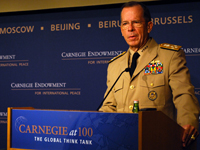Registration
Thank you!
You will receive an email confirming your registration.
Chairman of the Joint Chiefs of Staff Admiral Mike Mullen reflected on his tenure—which has included the troop surge in Iraq, an overhaul of strategy in Afghanistan, the killing of Osama bin Laden in May, and the end of the Don’t Ask, Don’t Tell policy—just days before the end of his term. Carnegie’s Jessica Mathews introduced him and moderated the conversation.
Iraq
Mullen stated that the surge in Iraq, which began four years ago, has transformed a situation that was seen as one of despair into one in which 26 million Iraqis have a much brighter future.
A Focus on Af-Pak
- Afghanistan: The Chairman stressed the impact of placing more resources into Afghanistan, which he referred to as “the epicenter of terrorism.” He recalled the killing of Osama bin Laden as the single best day of his tenure, while noting the steady progress that the United States has made following the deployment of additional Marines in Helmand province.
- Regional Focus: The United States must continue to focus on Afghanistan to prevent it from deteriorating into a failed state, Mullen said, but a regional focus is also equally important. Events in Iran, Pakistan, India, China, and other neighboring states cannot be separated from U.S. strategy in Afghanistan.
- Pakistan: The U.S. relationship with Pakistan is critical, Mullen said, noting that it is important for the Inter-Services Intelligence (ISI) to disconnect from the Haqqani network and what he described as “the proxy war that they’re fighting.” Solving the complicated issue of Kashmir would also unlock many issues between India and Pakistan, he added.
- Assassination of former Afghan President Rabbani: Mullen argued that it is still too soon to predict what impact the assassination of former Afghan President Burhanuddin Rabbani will have on Afghanistan. However, he pointed out that Afghan and international leaders need to act to ensure that this loss does not prove destabilizing.
The Health of the U.S. Armed Forces
- Long Deployments: With repeated 15-month deployments, American troops and their families need relief and more time at home, Mullen said.
- Greater Communication: Mullen also stressed that the military needs to directly communicate with the American people and provide a more comprehensive understanding of the experiences and sacrifices of men and women in uniform.
- Youth Service: The Admiral suggested that American youth would benefit greatly from serving their communities in any capacity, whether through military service, the Peace Corps, non-governmental organizations, or other such organizations.
The Rest of the World
- Areas of Focus: In addition to prioritizing the broader Middle East and the health of the force during his tenure, Mullen emphasized that he put significant work into securing the New START agreement with Russia and strengthening U.S. relationships with Japan and Korea, among other areas.
- Cyber Warfare: Mullen called cyber warfare a significant threat due to the absence of boundaries and rules governing this realm. A structure may be needed to limit its danger in the near future, he added.
- Iran: Chairman Mullen also pointed out that the United States has not talked to Iran since 1979, adding that even at the height of the Cold War, the United States maintained links to the Soviet Union. This lack of communication, he warned, makes it “virtually assured” that there would be miscalculations in the region. Because Iran is pursuing a nuclear program, a lack of communication is even more problematic, he argued. He suggested that it would be in the American national interest to resume contact with Tehran at either a political, diplomatic, or military-to-military level.
The Budget
- Strategic Focus: Mullen stated that the U.S. military plan should be strategically focused and the budget should then be formulated to support it.
- Security Threat: Mullen called the U.S. debt one of the biggest threats to American national security.
Looking to the Future
- Apolitical Military: Mullen stressed the importance of keeping the military completely apolitical.
- Open Door: He also remarked that it is absolutely vital to keep the Joint Chiefs involved in most discussions at the highest levels of government and to keep the door of engagement open between the White House, Congress, and the military.
SecurityPolitical ReformMilitaryForeign PolicyNorth AmericaMiddle EastSouth AsiaAfghanistanEgyptGulfLevantMaghreb
